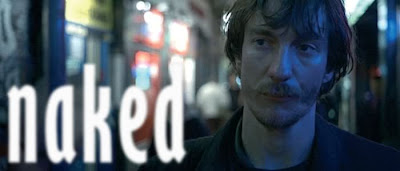Watching Naked for the first time is quite like getting a tattoo someplace awkward. It can be aggravating, abrasive, noisy, and downright unpleasant during the duration. However, once you are finished, and you sit back and admire the work done, it can be an entirely satisfying and meaningful experience. As we follow the bitter and egotistical Johnny across London, we are witness to a man who is entirely unsatisfied with the world around him, and will stop and take the time to let you know about it. He seduces women, only to use their attraction as a form of punishment against them. He pontificates and preaches at great length about subjects that run the gamut from nihilism to transhumanism regardless of the interest of his audience. He is both a victim and a tormentor, mixing pain and pleasure to further levy control over those he views as weak and therefore beneath him. And he can never stop moving. Whether it's to escape the inevitable consequences of his actions, or because he is afraid to become stagnant, Johnny is always running. Any time it seems like Johnny might become stationary due to someone or something, he flees.
As I watch David Thewlis slip into the skin of this manic-depressive pariah, I can't help but admire the talent shown in both actor and director here. Thewlis and Leigh create in Johnny a Hamlet for Generation X. Disaffected, bitter, reckless, but eloquent and painfully aware of his own brilliance, Johnny can't help but try and provoke everyone he meets for a chance to display his believed superiority. He scoffs at people who work regular jobs, mocking the normalcy and routine of it all, while he pinballs his way around whatever locale he just happens to find himself in with no direction or intention. He chases women, and then grows tired of them almost immediately. He steals books, money, food, and time from anyone he can. This behavior, while cheeky at best and reckless at worst, is echoed darkly by Leigh's scenes with Jeremy, the sadistic and corrupt landlord that uses his money and position to assert power over those he controls. Kept apart for almost the entirety of the film, once Johnny and Jeremy finally cross paths, it is a scene where Johnny is left completely vulnerable for the first time in the film, as all of Johnny's intellectual superiority is rendered useless. Johnny may be clever enough to survive outside of society and in spite of it; but Jeremy is almost the personification of the late 80's early 90's "high" society, and scoffs in the face of any threat posed by other people. He knows he has control because he is simply more dangerous than anyone else in the room.
Mike Leigh has been praised for his work on this film, and rightfully so. He is able to capture the ever-changing attitude of Johnny with shots that alternate from manic panning back and forth of two adjacent rooms, close-ups on characters' faces as they attempt to mask their emotions, or long stark wide shots as Johnny espouses his apocalyptic beliefs to a lone night guard or as he walks aimlessly down a filthy, dark alley. The film uses hand-held cameras to provide a jarring, jittery movement to the film at times to mirror Johnny's emotion, usually his mania. The prominent grainy texture of the film also adds to the overall state of Johnny's life and experiences, creating an atmosphere of unpleasantness that our main character seems to wrap himself in like a shroud.
Overall, I found Naked to be harsh and aggravating at times, but in a good way. It was engaging and interesting and never let up on me for a moment. It almost seems like a companion piece to Happy-Go-Lucky, with Johnny's crushing nihilism and pessimism in the face of normalcy countered by Poppy's almost impossible optimism in the face of the very same normalcy, and how society often reacts in similar fashions to these wildly different deviations of behavior. Whatever statement Leigh might be making on society's acceptance of the rejection of such personalities is second to his ability to craft such extreme personalities and then insert them into situations of near-painful averageness and set them loose for maximum entertainment. 7/10










